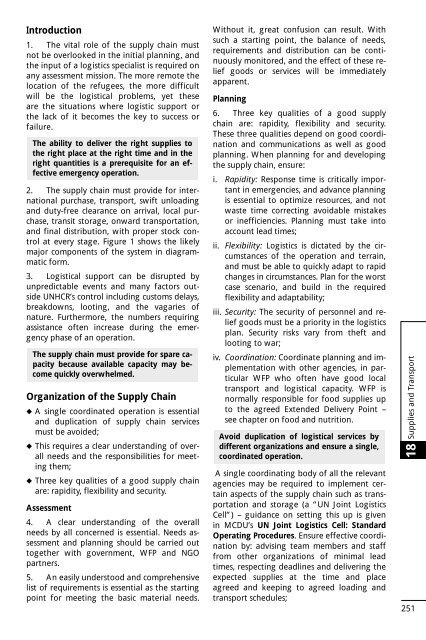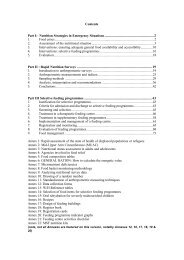UNHCR Handbook for Emergencies - UNHCR eCentre
UNHCR Handbook for Emergencies - UNHCR eCentre
UNHCR Handbook for Emergencies - UNHCR eCentre
You also want an ePaper? Increase the reach of your titles
YUMPU automatically turns print PDFs into web optimized ePapers that Google loves.
Introduction<br />
1. The vital role of the supply chain must<br />
not be overlooked in the initial planning, and<br />
the input of a logistics specialist is required on<br />
any assessment mission. The more remote the<br />
location of the refugees, the more difficult<br />
will be the logistical problems, yet these<br />
are the situations where logistic support or<br />
the lack of it becomes the key to success or<br />
failure.<br />
The ability to deliver the right supplies to<br />
the right place at the right time and in the<br />
right quantities is a prerequisite <strong>for</strong> an effective<br />
emergency operation.<br />
2. The supply chain must provide <strong>for</strong> international<br />
purchase, transport, swift unloading<br />
and duty-free clearance on arrival, local purchase,<br />
transit storage, onward transportation,<br />
and final distribution, with proper stock control<br />
at every stage. Figure 1 shows the likely<br />
major components of the system in diagrammatic<br />
<strong>for</strong>m.<br />
3. Logistical support can be disrupted by<br />
unpredictable events and many factors outside<br />
<strong>UNHCR</strong>’s control including customs delays,<br />
breakdowns, looting, and the vagaries of<br />
nature. Furthermore, the numbers requiring<br />
assistance often increase during the emergency<br />
phase of an operation.<br />
The supply chain must provide <strong>for</strong> spare capacity<br />
because available capacity may become<br />
quickly overwhelmed.<br />
Organization of the Supply Chain<br />
◆ A single coordinated operation is essential<br />
and duplication of supply chain services<br />
must be avoided;<br />
◆ This requires a clear understanding of overall<br />
needs and the responsibilities <strong>for</strong> meeting<br />
them;<br />
◆ Three key qualities of a good supply chain<br />
are: rapidity, flexibility and security.<br />
Assessment<br />
4. A clear understanding of the overall<br />
needs by all concerned is essential. Needs assessment<br />
and planning should be carried out<br />
together with government, WFP and NGO<br />
partners.<br />
5. An easily understood and comprehensive<br />
list of requirements is essential as the starting<br />
point <strong>for</strong> meeting the basic material needs.<br />
Without it, great confusion can result. With<br />
such a starting point, the balance of needs,<br />
requirements and distribution can be continuously<br />
monitored, and the effect of these relief<br />
goods or services will be immediately<br />
apparent.<br />
Planning<br />
6. Three key qualities of a good supply<br />
chain are: rapidity, flexibility and security.<br />
These three qualities depend on good coordination<br />
and communications as well as good<br />
planning. When planning <strong>for</strong> and developing<br />
the supply chain, ensure:<br />
i. Rapidity: Response time is critically important<br />
in emergencies, and advance planning<br />
is essential to optimize resources, and not<br />
waste time correcting avoidable mistakes<br />
or inefficiencies. Planning must take into<br />
account lead times;<br />
ii. Flexibility: Logistics is dictated by the circumstances<br />
of the operation and terrain,<br />
and must be able to quickly adapt to rapid<br />
changes in circumstances. Plan <strong>for</strong> the worst<br />
case scenario, and build in the required<br />
flexibility and adaptability;<br />
iii. Security: The security of personnel and relief<br />
goods must be a priority in the logistics<br />
plan. Security risks vary from theft and<br />
looting to war;<br />
iv. Coordination: Coordinate planning and implementation<br />
with other agencies, in particular<br />
WFP who often have good local<br />
transport and logistical capacity. WFP is<br />
normally responsible <strong>for</strong> food supplies up<br />
to the agreed Extended Delivery Point –<br />
see chapter on food and nutrition.<br />
Avoid duplication of logistical services by<br />
different organizations and ensure a single,<br />
coordinated operation.<br />
A single coordinating body of all the relevant<br />
agencies may be required to implement certain<br />
aspects of the supply chain such as transportation<br />
and storage (a “UN Joint Logistics<br />
Cell”) – guidance on setting this up is given<br />
in MCDU’s UN Joint Logistics Cell: Standard<br />
Operating Procedures. Ensure effective coordination<br />
by: advising team members and staff<br />
from other organizations of minimal lead<br />
times, respecting deadlines and delivering the<br />
expected supplies at the time and place<br />
agreed and keeping to agreed loading and<br />
transport schedules;<br />
Supplies and Transport<br />
18<br />
251



